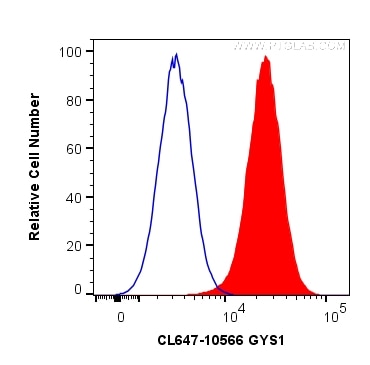- Featured Product
- KD/KO Validated
CoraLite® Plus 647-conjugated GYS1 Polyclonal antibody
GYS1 Polyclonal Antibody for FC (Intra)
Host / Isotype
Rabbit / IgG
Reactivity
human, mouse, rat
Applications
FC (Intra)
Conjugate
CoraLite® Plus 647 Fluorescent Dye
Cat no : CL647-10566
Synonyms
Validation Data Gallery
Tested Applications
| Positive FC detected in | HepG2 cells |
Recommended dilution
| Application | Dilution |
|---|---|
| Flow Cytometry (FC) | FC : 0.20 ug per 10^6 cells in a 100 µl suspension |
| It is recommended that this reagent should be titrated in each testing system to obtain optimal results. | |
| Sample-dependent, Check data in validation data gallery. | |
Product Information
CL647-10566 targets GYS1 in FC (Intra) applications and shows reactivity with human, mouse, rat samples.
| Tested Reactivity | human, mouse, rat |
| Host / Isotype | Rabbit / IgG |
| Class | Polyclonal |
| Type | Antibody |
| Immunogen | GYS1 fusion protein Ag0857 |
| Full Name | glycogen synthase 1 (muscle) |
| Calculated Molecular Weight | 84 kDa |
| Observed Molecular Weight | 84 kDa |
| GenBank Accession Number | BC007688 |
| Gene Symbol | GYS1 |
| Gene ID (NCBI) | 2997 |
| Conjugate | CoraLite® Plus 647 Fluorescent Dye |
| Excitation/Emission Maxima Wavelengths | 654 nm / 674 nm |
| Form | Liquid |
| Purification Method | Antigen affinity purification |
| Storage Buffer | PBS with 50% Glycerol, 0.05% Proclin300, 0.5% BSA, pH 7.3. |
| Storage Conditions | Store at -20°C. Avoid exposure to light. Stable for one year after shipment. Aliquoting is unnecessary for -20oC storage. 20ul sizes contain 0.1% BSA. |
Background Information
GYS1(Glycogen [starch] synthase, muscle) is the the rate limiting enzyme of the insulin-induced glycogenesis, transferring glucose units from UDP-Glc to a glycogen primer. It catalyzes the linear addition of glucose residues to the branching structure of glycogen, providing a convenient store of glucose for times of metabolic need. This protein has 2 isoforms produced by alternative splicing.
Protocols
| Product Specific Protocols | |
|---|---|
| FC protocol for CL Plus 647 GYS1 antibody CL647-10566 | Download protocol |
| Standard Protocols | |
|---|---|
| Click here to view our Standard Protocols |


